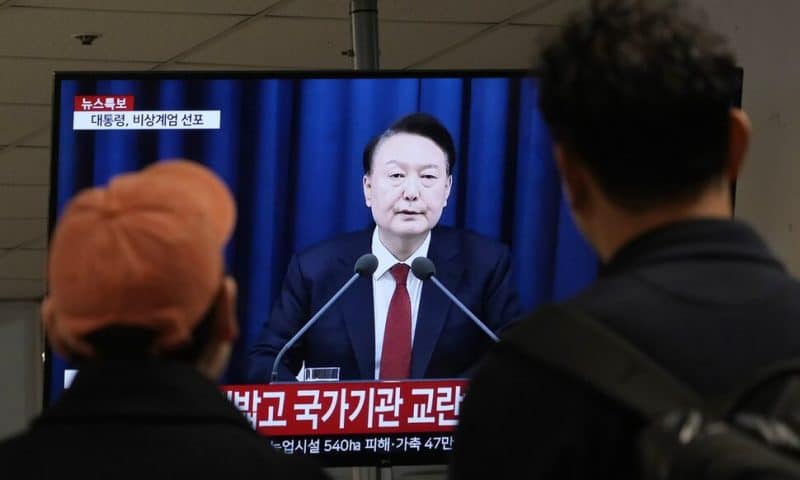South Korean President Yoon Suk Yeol declared martial law, and then said he would lift the order after widespread condemnation of the move.
South Korean President Yoon Suk Yeol on Tuesday took the extraordinary step of declaring martial law, accusing the opposition that controls the country’s parliament of sympathizing with North Korea and of “trying to overthrow the free democracy.”
But lawmakers quickly defied his wishes and adopted a resolution demanding an end to martial law, and hours after his first announcement, Yoon reversed course and said he would lift the order.
When he first announced the declaration, Yoon said that the country was “in a precarious situation where it would not be surprising if it collapsed immediately.” He added that he would use martial law to “rebuild and defend the free Republic of Korea, which is falling into ruin” and to protect from the “threats of North Korean communist forces and to eradicate the shameless pro-North Korean anti-state forces that are plundering the freedom and happiness of our people.”
“To this end, I will surely eradicate the criminals of the anti-state forces who have been committing atrocities so far,” he said.
However, by law, Yoon was required to honor the resolution passed by the South Korean parliament to end martial law.o end martial law.
“The president should immediately lift the emergency martial law following the voting by the National Assembly. Now, [the] emergency martial law declaration is invalid,” said Woo Won-sik, the chairman of the National Assembly.
Yoon’s martial law declaration was denounced by both the opposition and the leader of Yoon’s own conservative party, who called it “wrong.”
What Happens Now?
Yoon said he would lift the order as soon as he convened his cabinet, and troops that had entered the main parliamentary building started withdrawing following the vote, according to Korean newspaper Chosun Ilbo.
But he didn’t specify exactly what time martial law declaration would end in South Korea, which is 18th in U.S. News & World Report’s Best Countries rankings. South Korea also ranks No. 26 for political stability in the annual analysis, based on the perceptions of survey respondents around the globe.
Yoon acknowledged in his speech that some citizens would experience inconveniences during martial law.
“The declaration of martial law will cause some inconvenience to the good people who have believed in and followed the values of the Constitution of the free Republic of Korea, but I will focus on minimizing these inconveniences,” he said. “These measures are necessary for the perpetuation of a free Republic of Korea, and there is no change in our foreign policy stance of fulfilling our responsibilities and contributions in the international community.”
Under the constitution, martial law allows the president to limit freedom of the press. Army Gen. Park An-soo, who was appointed martial law commander, said in a decree that “all news media and publications are under the control of martial law command.”
Who Is South Korean President Yoon Suk Yeol?
Yoon was elected president of South Korea in 2022, and he has been in almost constant conflict with the opposition since then.
He made several controversial remarks during his campaign for president, including blaming feminism for South Korea’s low birth rates and claiming there was “basically no radiation leak” during the Fukushima nuclear accident of 2011.
Yoon has denied wrongdoing in a scandal involving him and his wife allegedly exerting inappropriate influence on the ruling party to pick a certain candidate to run for a parliamentary by-election in 2022.
Before becoming president, Yoon was a lawyer and served as prosecutor general.
What Is Martial Law?
Martial law generally refers to military rule during an emergency when civil authorities are deemed unable to function properly.
The legal implications of martial law differ across countries, but they typically involve some level of suspension of normal civil rights.
Yoon’s decision is the first declaration of martial law since the country’s democratization. The previous declaration of martial law in South Korea was in October 1979.

